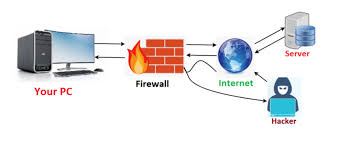
In an era dominated by digital connectivity, safeguarding the integrity and security of our networks is paramount. It is a crucial component of network security, acting as a barrier between your trusted internal network and the vast, potentially hazardous landscape of the internet.

What is a Firewall?
A firewall is a computer network security system that restricts internet traffic in to, out of, or within a private network. This software or dedicated hardware-software unit functions by selectively blocking or allowing data packets.

It is a network security device, either hardware or software-based, which monitors all incoming and outgoing traffic and based on a defined set of security rules it accepts, rejects or drops that specific traffic. Accept : allow the traffic Reject : block the traffic but reply with an “unreachable error” Drop : block the traffic with no reply A firewall establishes a barrier between secured internal networks and outside untrusted network, such as the Internet.
Why Do We Need Firewalls?
Firewalls provide protection against outside cyber attackers by shielding your computer or network from malicious or unnecessary network traffic. It can also prevent malicious software from accessing a computer or network via the internet. Also it can be configured to block data from certain locations (i.e., computer network addresses), applications, or ports while allowing relevant and necessary data through. (See Understanding Denial-of-Service Attacks for more information.). They provide a vital layer of protection by analyzing and managing the flow of data, preventing unauthorized access and ensuring the confidentiality, integrity, and availability of your network.
What does a firewall do?
A firewall filters data entering your network. It analyzes that data by checking the sender’s address, the application the data is meant for, and the contents of the data. By combining these defined data points, a firewall can tell what’s harmful and what isn’t. Then the firewall opens or closes the network gate accordingly.

The primary purpose of a firewall is to check if traffic or an incoming connection meets a predefined set of security standards, which is critical for internet security.
Key Functions of Firewalls:
Firewalls come in various forms, each catering to specific needs and environments. They can be hardware-based, software-based, or a combination of both. Some operate at the network layer, while others function at the application layer. Understanding these distinctions is key to deploying the right firewall solution for your unique requirements.
Packet Filtering: Using packet filtering involves configuring rules to inspect and control the flow of network traffic based on specific criteria within the packet headers. Examining packets of data and allowing or blocking them based on predefined criteria.
Stateful Inspection: Monitoring the state of active connections and making decisions based on the context of the traffic. It keeps track of the state of each connection and makes decisions based on the context of the traffic, enhancing the security and intelligence.
Proxy Services: Acting as intermediaries between users and the internet to enhance security and anonymity. It offer a versatile set of tools for managing and securing internet traffic. By serving as intermediaries, proxies empower administrators to enforce policies, enhance privacy, and protect their networks from various threats.
Network Address Translation (NAT): NAT is a crucial component of firewall configurations, enabling secure and efficient communication between internal networks and the external internet while providing a level of address space conservation and security. Masking internal IP addresses to enhance security and conserve public IP addresses.
Advantages of Using Firewalls
- Firewalls play an important role in the companies for security management. Below are some of the important advantages.
- It provides enhanced security and privacy from vulnerable services. It prevents unauthorized users from accessing a private network that is connected to the internet.
- It provide faster response time and can handle more traffic loads.
- It allows you to easily handle and update the security protocols from a single authorized device.
- It safeguards your network from phishing attacks.






Hi, this is a comment.
To get started with moderating, editing, and deleting comments, please visit the Comments screen in the dashboard.
Commenter avatars come from Gravatar.